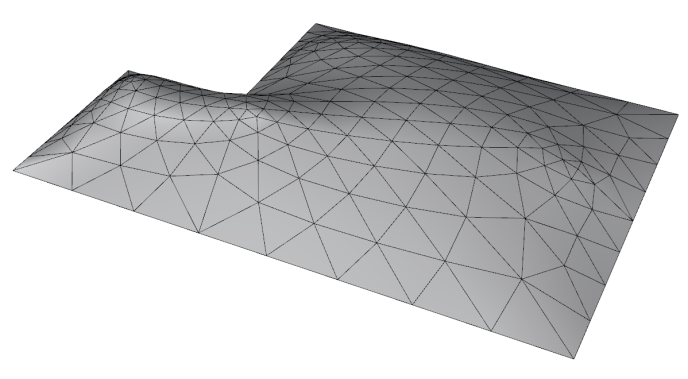Re-mesh of any given tri-mesh into a quad-only mesh. This is achieved by integrating two conjugated vector fields.
The family of conjugated vector fields comes from a non-linear interpolation of two vector fields: one aligned to the principal curvatures and another with the principal stress direction.
This results in a tradeoff which brings edges aligned to the principal stress curves and faces being almost planar.

All the algorithms implemented for this research have been collected into Capybara, a grasshopper plugin, presented at IASS 2018 at MIT
WORKFLOW

INITIAL MESH
PRINCIPAL STRESS (BLACK) PRINCIPAL CURVATURE(RED)

SUBSET OF THE VECTOR FIELDS

INTERPOLATED FIELDS

CONJUGATED FIELDS

FRAME FIELD MESH

FRAME FIELD MESH WITH ISOCURVES
GRIDSHELL

Initial Vector fields and final quad-only mesh. The rectangles show the areas where vector fields were sampled.

BIBLIOGRAPHY
OVERVIEW ON TOP-DOWN APPROACH
Structuring free-form building envelopes
Thesis (M.Phil.) - University of Bath, 2012. 2012
MESH CURVATURE
Szymon Rusinkiewicz. Estimating Curvatures and Their Derivatives on Triangle Meshes. Symposium on 3D Data Processing, Visualization, and Transmission, September 2004.
N-POLYVECTOR FIELD
Olga Diamanti, Amir Vaxman, Daniele Panozzo, Olga Sorkine-Hornung. Designing N-PolyVector Fields with Complex Polynomials, 2014
CONJUGATED FIELDS FOR QUAD MESH PLANARITY
Yang Liu, Weiwei Xu, Jun Wang, Lifeng Zhu, Baining Guo, Falai Chen, Guoping Wang. General Planar Quadrilateral Mesh Design Using Conjugate Direction Field, 2008.
QUAD REMESHING
Daniele Panozzo, Enrico Puppo, Marco Tarini, Olga Sorkine-Hornung. Frame Fields: Anisotropic and Non-Orthogonal Cross Fields, 2014.
QUAD PLANARIZATION
Sofien Bouaziz, Mario Deuss, Yuliy Schwartzburg, Thibaut Weise, Mark Pauly Shape-Up: Shaping Discrete Geometry with Projections, 2012